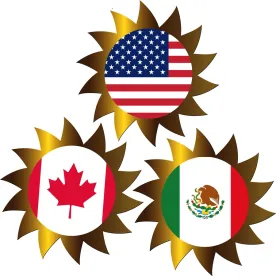The Trump administration has indicated its intention to renegotiate the North American Free Trade Agreement (“NAFTA”). Currently, a draft letter is being circulated by the U.S. Trade Representative to members of Congress for their review. Stephen Vaughn, acting U.S. Trade Representative, wrote in the draft notification letter that “[t]he persistent U.S. deficit in goods trade with Canada and Mexico demands that this administration take swift action to revise the relationship to reflect and respond to new 21st century challenges.” If approved by Congress, formal negotiations with Mexico and Canada could start later this year.
The draft notification letter outlines the Trump administration’s objectives in renegotiating NAFTA, with a focus on reducing the trade deficit and strengthening rules of origin to support domestic production. While a far cry from President Trump’s previous statements to pull out of NAFTA entirely, the proposed changes align with his “Buy American, Hire American” campaign theme.
One proposal seeks to reinstate temporary tariffs, often referred to as snapbacks, on goods that pose a “serious injury or threat of serious injury” to U.S. companies. The ramifications of snapbacks are that Mexico or Canada could implement counteractive measures through blocking certain U.S. goods, increasing import duties, or establishing other nontariff barriers. On a commercial level, if implemented, U.S. companies will find it harder to conduct business in Mexico and Canada. This has obvious implications for both supply and distribution chains.
Another NAFTA proposal seeks to “improve” dispute settlement procedures between foreign investors and host states. Currently, a company that wishes to contest a state action of a NAFTA signatory country may institute a private arbitration against the state. NAFTA arbitrations act as a substitute for domestic judicial review that cannot be reviewed by domestic courts. Not having to contend with unfamiliar judicial processes provides comfort to foreign businesses, so curtailing these procedures will also change the amount of risk involved in cross-NAFTA supply chain relationships.
What should we expect next? Under the U.S. Trade Promotion Authority, the president must submit the notification of intent to renegotiate NAFTA to Congress to trigger a 90-day review period. The notification must state the administration’s negotiating objectives, the date when negotiations will commence, and the proposed changes to NAFTA. During the review period, Congressional Advisory Groups within the House Ways and Means Committee and Senate Finance Committee will consult with the president on the proposed changes. Thirty days prior to the renegotiation date, a comprehensive summary of the negotiation objectives, including how to achieve the objectives and their benefit to the U.S., are published on the U.S. Trade Representative website.
Of particular importance to NAFTA supply chains, the Trump administration is required to assess the impact of any changes in tariffs on textile and apparel products, among other products such as those in the agriculture or automotive industry. Further, committees on import-sensitive products within the textiles and apparel industry will hold special consultations with the administration. Companies with an interest in the proposed changes to NAFTA will want to engage with industry trade groups or trade negotiators within the government to set forth their positions on the negotiations.




 />i
/>i
